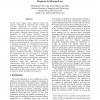Free Online Productivity Tools
i2Speak
i2Symbol
i2OCR
iTex2Img
iWeb2Print
iWeb2Shot
i2Type
iPdf2Split
iPdf2Merge
i2Bopomofo
i2Arabic
i2Style
i2Image
i2PDF
iLatex2Rtf
Sci2ools
119
click to vote
IEEEAMS
2002
IEEE
2002
IEEE
Understanding Consistency Maintenance in Service Discovery Architectures in Response to Message Loss
Current trends suggest future software systems will comprise collections of components that combine and recombine dynamically in reaction to changing conditions. Service-discovery protocols, which enable software components to locate available software services and to adapt to changing system topology, provide one foundation for such dynamic behavior. Emerging discovery protocols specify alternative architectures and behaviors, which motivate a rigorous investigation of the properties underlying their designs. Here, we assess the ability of selected designs for service-discovery protocols to maintain consistency in a distributed system during severe message loss. We use an architecture description language, called Rapide, to model two different architectures (two-party and three-party) and two different consistency-maintenance mechanisms (polling and notification). We use our models to investigate performance differences among combinations of architecture and consistency-maintenance m...
Architecture | Consistency-maintenance Mechanism | IEEEAMS 2002 | Internet Technology | Service-discovery Protocols |
| Added | 15 Jul 2010 |
| Updated | 15 Jul 2010 |
| Type | Conference |
| Year | 2002 |
| Where | IEEEAMS |
| Authors | Christopher Dabrowski, Kevin L. Mills, Jesse Elder |
Comments (0)

